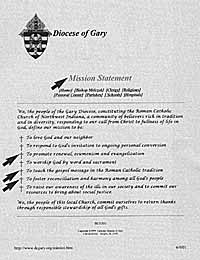A Closed Church, Bishop Melczek, the Latin Mass, and Vatican II
| In December, 1999, Mr. Jeffrey Maki, a local business owner, together with Dr. Fred Meccia, a local podiatrist, both traditional Catholics, purchased Immaculate Heart of Mary Catholic Church, Kingsford Heights, Indiana, from the Diocese of Gary, Indiana, which had closed the church earlier in the year. The correspondence of the following pages has resulted. |
 |
MR. MAKI RESPONDS TO THE DIOCESE
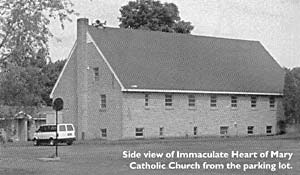
Side view of Immaculate Heart of Mary Catholic Church from the parking lot.
|
Jeffrey A. Maki 2-15-01 Dear Ann, I was moved to respond to your call on the 2nd of January 2001 in which you called to inquire about the property I purchased from the Arch Diocese last year. I was very surprised when you informed me that there are church laws against having a Catholic Mass in the confines of the Immaculate Heart of Mary Church. I am waiting on your correspondence to provide me with written proof of this.
|
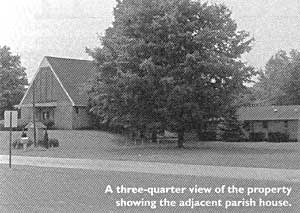
A three-quarter view of the property showing the adjacent parish house.
MISSION STATEMENT
Diocese of Gary
"We, the people of the Gary Diocese, constituting the Roman Catholic Church of Northwest Indiana, a community of believers rich in tradition and in diversity, responding to our call from Christ to fullness of life in God, define our mission to be:
- To love God and our neighbor
- To respond to God's invitation to ongoing personal conversion
- To promote renewal, ecumenism and evangelization
- To worship God by word and sacrament
- To teach the gospel message in the Roman Catholic tradition
- To foster reconciliation and harmony among all God's people
- To raise our awareness of the ills in our society and to commit our resources to bring about social justice.
We the people of this local Church, commit ourselves to return thanks through responsible stewardship of all of God's gifts.
BISHOP MELCZEK REPLIES TO MR. MAKI
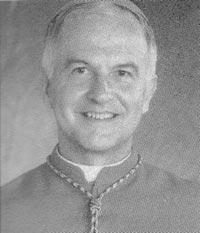
February 26, 2001
Mr. Jeffrey A. Maki Dear Mr. Maki: Anne Verbeke referred your February 19, 2001 letter to me. You raise several important issues which can best be clarified through more lengthy discussions. I would just cite some appropriate Canons from the Code of Canon Law which was promulgated by Pope John Paul II in 1983. In accordance with Canon 1222 §2, I reduced the former Immaculate Heart of Mary Parish Church to profane use after celebrating the last Mass in that church. Canon 1223 indicates that the bishop can grant permission for a building to be used as an oratory where divine worship may be celebrated for the benefit of some community. It further stipulates that other members of the faithful may also have access to it with the consent of the competent superior. Canon 1228 indicates that the permission of the local bishop is required for Mass and other sacred celebrations to take place in a private chapel. To help understand why the Mass and other sacred liturgies are not determined by the desires of private individuals but are regulated by the whole Church, I would refer you to Canon 837 which says in part: "Liturgical actions are not private actions but celebrations of the Church itself, which is 'the sacrament of unity,' namely, a holy people assembled and ordered under the bishops; therefore liturgical actions pertain to the whole body of the Church and manifest and affect it, but they affect the individual members of the Church in different ways according to the diversity of orders, functions and actual participation." Canon 838 indicates that the supervision of the sacred liturgy depends solely upon the authority of the Church which resides in the Apostolic See and, in accord with the law, the diocesan bishop. There are several other appropriate canons and the liturgical laws associated with the Mass and each of the sacraments. Any Roman Catholic priest would be very much aware of these directives and would choose to abide by them. You mentioned the Tridentine Mass. Bishops have been authorized by the Holy See to authorize the Tridentine Mass in their dioceses under certain conditions. In point of fact there is a legitimately celebrated Tridentine Mass at the Carmelite Community in Munster each week. The Official Catholic Directory lists all of those institutions and priests legitimately constituted who are functioning in the United States. It is updated each year. The 1999 edition lists 29 priests by the name Scott. There is no Peter Scott listed. I would suspect that is because he is, as you indicated in your letter, a member of the Society of St. Pius X. That is not a religious community in good standing with the Roman Catholic Church. Bishops may not allow priests who are not in good standing in the Roman Catholic Church to celebrate liturgies for their faithful. This is certainly an inadequate response to your concerns, but I hope it is somewhat helpful.
DJM/vm cc: Reverend Jon J. Plavcan, Administrative Assistant to the Bishop |
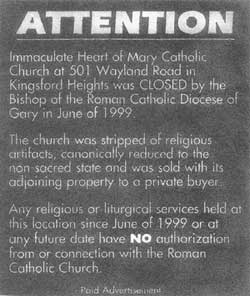 |
The notice placed by the diocese in a local newspaper in response to the advertisement on the title page inviting people to the Latin Mass for Jan. 1, 2001. |
FR. SCOTT'S RESPONSE TO BISHOP MELCZEK
|
Society of Saint Pius X Father Peter R. Scott 2918 Tracy Avenue Most Reverend Dale J. Melczek, DD Re: Immaculate Heart of Mary Catholic Church, Kingsford Heights, IN J.M.J. Your Excellency, I am writing with respect to your letter of February 26 to Mr. Jeffrey Maki. As Mr. Maki stated, I am a priest of the Society of Saint Pius X and I have celebrated Mass in this church, saved from desecration by the efforts and sacrifices of a couple of local businessmen. Your response to Mr. Maki's concerns is inadequate. I thought that you might appreciate some pointers as to what the traditional Catholic faithful might consider adequate. Your statement that the Society of Saint Pius X is not a religious community in good standing with the Roman Catholic Church is certainly false. It was on November 1, 1970 that we received our first approval and on February 18, 1971 that we received a decree of praise of our statutes by Cardinal Wright. This canonical status was never legitimately suppressed. It is certainly true that our Society has been repeatedly attacked and calumniated on account of its uncompromising attachment to Catholic Tradition, and in particular its exclusive use of the Tridentine Mass, guaranteed to all priests in perpetuity by Pope St. Pius V in the Bull Quo Primum, its faithful adherence to the teachings of the Popes who have repeatedly condemned liberalism, especially Gregory XVI, Pius IX, Leo XIII, St. Pius X, Pius XI and Pius XII, and its refusal of the errors of the Second Vatican Council that were condemned by all these holy Popes, especially religious liberty, ecumenism, collegiality and the adaptation of the Church to the modern world. However, contacts initiated by Cardinal Castrillon Hoyos last August and continued to the present time, confirm that Rome has accepted that as true Roman Catholics we do have the right to the exclusive use of the traditional Mass, and that we do have the right to refuse the New Mass on principle and the errors of the Second Vatican Council. If Catholics of your diocese have not only invited in the priests of the Society of Saint Pius X, but even gone to the extent of purchasing one of your parish churches for the celebration of the traditional Mass, it is for a reason. It is because the Society's priests are providing something that your priests are not providing. Faithful Catholics, who adhere to the entirety of Catholic doctrine, and who refuse the post-conciliar revolution, with its overturning of the Mass, its destruction of the teaching of the Baltimore catechism, its ridiculing of practices of piety such as regular Confession, the daily Rosary and the Way of the Cross, and with its effacing of the real difference between Catholics and members of heretical sects, will not be satisfied with an occasional Indult Mass. They want the real thing. Mass celebrated by priests who will only celebrate the traditional Mass, who are not afraid of traditional piety, who teach all Catholic dogmas unashamedly and who roundly condemn modern day ecumenism, which has destroyed Catholics' sense of identity, of belonging to the one true Church, outside of which there is no salvation. You rightly point out the authority that Canon Law gives to you, and that it is clearly in your power to provide an entirely traditional parish for true Catholics. I challenge you to use that authority, on the use of which you will be judged, to build up the work of Catholic Tradition, the deposit of Faith and liturgical life handed down from the earliest centuries of the Church. Stop the New Mass. Stop the modernist heresies so roundly condemned by St. Pius X. Return to the Baltimore catechism. Stop communion in the hand, eucharistic ministers and altar girls, all of which destroy the Catholic Faith in the Real Presence. Place a ban on all ecumenical ceremonies. Erect a traditional parish, or at least approve Immaculate Heart of Mary for use by the priests of the Society of Saint Pius X, and put your weight behind the exclusive celebration of the Tridentine Mass that it was built for. This is all the faithful need and all they want, but they will settle for nothing less, and will certainly call on the priests of the Society for help as long as they see their Faith and sanctification threatened by never-ending changes. Please be assured of my prayers for you in the Canon of the Mass, whenever I celebrate at Immaculate Heart of Mary. I will pray that the Holy Ghost will guide you to best defend the Faith in this time of crisis. If you would like further explanations, I am at your disposition, and if you decide to approve this work of Tradition, you will find no more docile priests that those of the Society of Saint Pius X. Yours faithfully in the Immaculate Heart of Mary, Father Peter R. Scott CC: Mr. Jeffrey A. Maki
|
MR. MAKI ASKS FOR A CLARIFICATION
|
Jeffrey A. Maki 3-7-01 Dear Bishop Melczek, First, I want to thank you for a prompt response to my letter February 19, 2001 to Ann Verbeke. Thank you and God Bless,
|
|
Jeffrey A. Maki 4-23-01 Re: 3-16-01 phone conversation Excellency, I am writing with respect to your most surprising phone call on the evening of the 16th of March. I apologize in the delay of my response, as I wanted to prepare a proper correspondence and my business obligations have been very pressing these last weeks. Please permit me to express my humble appreciation for your most surprising call. I am still in need of explanation from you on a number of points that you raised as we talked. They are as follows: 1. Could you please clarify that Vatican II was or was not a pastoral council? Excellency, Two thousand years of Catholic History and Tradition must have some impact on your foundation in the Catholic Faith at this point in time. I would only think of your own mother taking you to church when you were a child, what would she think of what is going on with the denial of the Tridentine Rite. I pray you will answer my questions and offer a positive response to my requests. I promise to pray for you daily on our family rosary and that your vocation as Bishop is one that The Blessed Virgin Mary will guide you in so all of your decisions please God first no matter how painfully right they may be. Better to suffer in this world than the next! May God Bless you Bishop Melczek, |
BISHOP MELCZEK REPLIES TO MR. MAKI
May 1, 2001 Mr. Jeffrey A. Maki Dear Mr. Maki: After receiving your April 23, 2001 letter, I attempted to reach you by telephone in order to elaborate more fully on the questions concerning which you seek clarifications. Obviously, I do not have the time to respond in a comprehensive way to all of your questions in writing. The Sacred Second Vatican Ecumenical Council is an ecumenical council in the very same sense as previous Councils called by the supreme pontiff, presided over by him, and confirmed by him. Each Council document begins with the phrase: "Paul Bishop, Servant of the Servants of God, together with the Council Fathers, for a permanent record." Each Council document ends in the following fashion: "What has been set down in this Constitution has been accepted by the Fathers of the Sacred Council in its entirety and in all its parts. And, together with the Venerable Council Fathers, we by the apostolic power granted to us by Christ, approve, decree, and establish it, and we order that what has been established in synod be promulgated for the glory of God." When Pope John XXIII convened the Council, he indicated that it was going to address matters affecting the pastoral life of the Church. This in no way excludes the fact that much dogma and doctrine is contained in the Constitutions of the Council. It is absolutely false that Roman Catholics do not have to accept what is written in this most solemn form of Church teaching. The major reasons that Archbishop Marcel Lefebvre and his followers were declared in schism from the Church were their refusal to accept the teachings of the Church as defined in the Council and the ordination of bishops neither appointed by nor approved by the Apostolic See. Obviously, they did not reject all of the teachings of the Council, but they rejected those which they judged themselves not in agreement with. I am including a copy of a very recent news article which gives some description of the status of the Fraternity of St. Plus X. It points out clearly that it is the desire of the Holy Father that they be restored to union with the Church. However, that is certainly not yet accomplished. It would take one or more books to describe the spiritual enrichment which has come out of Vatican II. Anything that I would attempt in a few sentences or a few paragraphs would do a vast injustice to the spiritual enrichment coming out of that Sacred Council. I would invite you to attend the celebration of the Holy Mass according to the Tridentine Rite at the Monastery in Munster to see that there is an extremely small portion of the 187,000 plus Roman Catholics in our diocese that desires to participate in Mass according to that rite. The densest part of the Catholic population is in the Western part of the diocese. There are many very large parishes in that area. Yet, so few people have any desire to participate in Holy Mass according to the Tridentine Rite. I believe that also speaks to the great spiritual enrichment which the people find in their participation in Holy Mass as prescribed by the revised Missal. The Church is a hierarchical structure and its decision-making processes are hierarchical. In the diocese, authority exists in the person of the bishop. Of course, it goes without saying that the bishop is bound by the Canon Laws of the Church. Priests teach licitly (lawfully) and they celebrate Holy Mass and the Sacraments licitly when they do so in union with the legitimately appointed bishop of the diocese. Priests of the Society of St. Pius X are not yet in union with the Holy See and, therefore, I could not grant permission for them to lawfully celebrate Holy Mass or the Sacraments in our diocese. As you can see from the attached article, the Holy Father has appointed a Commission to undertake discussions with the Society of St. Plus X with a view to their pardon and their restoration to union with the Holy See. The Holy See would have the documents giving their precise canonical status. That is a matter between the Holy See and the authorities within that Society. I do not have in my possession such documents. As I mentioned to you, I have no objections to lay people gathering together in the former church for devotions and novenas that it is legitimate for lay people to conduct. Indeed, they are free to do so in any gathering place, including their homes. I would also consider granting a priest with the faculties of the Diocese of Gary, thus obviously a priest in union with the Holy See, permission to celebrate, on a special and rare occasion, Holy Mass in the former church. Such a Mass would not satisfy the obligation for Sunday or holy day participation at Mass. I hope this response, though much briefer than I would want it to be, is helpful to you.
DJM/vm Enclosure |
FR. SCOTT FURTHER EXPOSES BISHOP MELCZEK
|
Society of Saint Pius X Father Peter R. Scott 2918 Tracy Avenue Most Reverend Dale J. Melczek, DD Re: Immaculate Heart of Mary Catholic Church, Kingsford Heights, IN J.M.J. Your Excellency, I wrote to you on this subject on February 28. You chose not to respond to the points that I made in my letter. However, on May 1 you responded to Mr. Maki's questions concerning the Second Vatican Council and the Society of Saint Pius X. These are the remarks that I consider misleading, and that I believe call for a response. As part of our present dialogue, I welcome your response to these objections. 1) It is certainly true that the Second Vatican Council was the 21stecumenical council and that it contains much dogma and doctrine, reiterating as it does many of the Church's teachings. However, it does not at all follow from this that it is the Church's most solemn form of teaching nor that Catholics are absolutely obliged to accept everything that is written in it. Allow me to back this up with texts. You will not be unaware that Pope John XXIII proclaimed the "especially pastoral character" of the teachings of Vatican II in his discourse for the opening of the Council on October 11,1962, and that this pastoral goal of the Council, in opposition to the definition of doctrine, was reiterated by Pope Paul VI in his discourse for the opening of the second session on September 29, 1963. However, the most explicit statement was made by the Council's Secretary General (Mgr. Felici) on November 16, 1964, in an explanatory note attached to the Council's Constitution on the Church (Lumen Gentium). Responding for all the documents, the Theological Commission had this to say:
Now we all know that there is nowhere in the texts of Vatican II such an open declaration binding Catholics to accept a point of faith and morals under pain of no longer being Catholics if that point were not accepted. As you know, this is one of the conditions for the infallibility of the Extraordinary Magisterium defined by Vatican I. Consequently, Vatican II is not at all the Church's most solemn form of teaching, as you claim. It does not contain any acts of the Extraordinary Magisterium, and its texts consequently do not benefit from the infallibility of the extraordinary Magisterium. This is what Pope Paul VI stated in his discourse for the closing of the Council, on December 7, 1965, in admitting that in Vatican II the Church's Magisterium "did not choose to pronounce under the form of extraordinary dogmatic definitions." The Pope later confirmed this in a public audience of January 12, 1966, during which he declared that the Council had "avoided proclaiming solemn dogmatic definitions that engage the infallibility of the Church's Magisterium." Quoting the above-mentioned declaration of November 16, 1964, he gave this official interpretation: "Given the Council's pastoral character, it avoided pronouncing in an extraordinary manner dogmas that have the mark of infallibility." Clearly, then, Vatican II refused to use its ability to define with the infallibility of the Extraordinary Magisterium, and is not like the other ecumenical Councils, and we do not owe it the same unquestioning submission as to other councils which did use the Church's most solemn authority, such as Nicea and Ephesus in antiquity and Florence, Trent and Vatican I in more recent times. You might respond that there are things in Vatican II which are guaranteed by the infallibility of the Ordinary Magisterium, which is not the Church's most solemn teaching authority, but which still exists. Most assuredly there are, when the documents of Vatican II repeat doctrines previously taught by the Church. However, this guarantee of infallibility of the Ordinary Magisterium only applies to those teachings that have always and everywhere been taught (Cf. Vat. I, Db1792), such as the physical resurrection of Our Lord from the dead. It most certainly does not apply to the novelties of Vatican II, and in particular religious liberty, collegiality, ecumenism, the liberalism of the modern world and the desacralizing of the liturgy. These are revolutionary novelties infiltrated into the documents of Vatican II, and have no part of the Church's teaching. It is our Catholic right and duty to question and refuse these novelties, for they destroy the Faith in the Catholic Church, outside of which there is no salvation. Note that this is not a question of personal judgement, but simply of applying the repeated teachings of the pre-Vatican II Popes against these liberal errors, that were infiltrated into the documents of Vatican II. It is truly a question of fidelity to the Magisterium. Allow me just to quote three documents, spanning a century, that condemn together many of the errors of the post-Vatican II revolution: The Syllabus of Errors of Bd Pius IX (1864), the anti-modernist encyclical Pascendi of St. Pius X (1907) and Humani Generis of Pope Pius XII (1950) against the modern errors. 2) Your Excellency, I am rather surprised that you would rely on newspaper articles to find out information on the Society of Saint Pius X. I can certainly send you many original documents if you are interested. You would see if you read these documents that the Society was never declared to be in schism, nor did any binding decision remove its right to oppose the novelties of the Second Vatican Council. I challenge you to find any official document from Rome stating either of these two things. There are none. I can assure that if the liberals in Rome could have made such declarations, they would surely have done so, so much have they attempted to destroy the work of Tradition. If Archbishop Lefebvre and the bishops that he consecrated were declared to have incurred an automatic (ipso facto) excommunication, it was because of a misinterpretation of Canon 1324, as I can easily demonstrate to you. It in no way indicates a separation from the Catholic Church. Indeed, the whole reason for their consecration was to provide Catholics with the traditional sacraments of Confirmation and Holy Orders, and the complete, integral teaching of the Faith, that the rest of the world's bishops refuse to provide. 3) You state that it would take books to describe the spiritual enrichment of Vatican II, but in fact you give no example. I challenge you to do so. There are many appearances of good in the revolutionary changes in the Church's liturgy and spiritual life since Vatican II, but underneath lies a profound corruption, the loss of the supernatural. For example, you might mention the use of the vernacular to help the faithful understand the Church's liturgy, and the response is that it was used to destroy the Church's sacredness, and that Catholics understood their Mass infinitely more with their daily Missal when it expressed the Catholic Faith in the unbloody renewal of Calvary so perfectly, when it was constantly the same sacred prayer anywhere, any time, than they do now. Whether it be devotion to the Holy Ghost, to the Blessed Virgin Mary, to the Passion of Our Divine Lord, to the Sacraments of the Church, to the Mass, or other spiritual helps such as spiritual reading, sacramentals and novenas, or any other aspect of Catholic life, the degradation since Vatican II is totally across the board. True devotion has been replaced with religious pluralism, tolerance, ecumenism, which are entirely natural, and have no supernatural value for the salvation of souls. 4) You use the democratic argument, namely that because the people of your diocese do not want the traditional Mass, then it is not good. Since when has right and wrong been determined by the opinion of the masses? In all honesty what chance do you really give them to learn to love the traditional Mass? Is it not your responsibility, and that of your priests, to educate and explain to the faithful the treasures contained in the traditional Mass and the rites for the administration of the sacraments? Are you really surprised that the faithful, who have been deprived of the complete nourishment of the traditional Mass for more than 30 years, whose Faith has been diluted by the humanistic modern liturgy, do not thirst for what they do not know? How can you use the argument that the faithful do not ask for the traditional Mass as an argument against it, when it is the priests' responsibility to instruct them to love it? I will believe in the spiritual enrichment of which you speak when I see crowds of young men and women trying to get into Seminaries and convents, when I see long lines of faithful waiting to receive the sacrament of Penance, when I see the faithful kneeling for long days and nights of adoration before the Blessed Sacrament, when I hear of the faithful all reciting their Rosary every day, as Our Lady requested at Fatima. 5) We certainly agree that in normal circumstances a priest must receive faculties from the bishop of the diocese to licitly offer the sacrifice of the Mass and administer the sacraments. It is within your power to grant that authorization to the priests of the Society for Immaculate Heart of Mary in Kingsford Heights. Your reason for refusing to do so, namely that we are not in communion with the Holy See, is simply false. Even if you were to consider that the Society's bishops had incurred a penalty for episcopal consecration without Papal mandate, it in no way follows that the priests and faithful are not in union with the Holy See. They pray for the Pope, they are submissive in questions of faith and morals (unlike the modernists) and they keep the Church's unchanging Faith. They have done nothing to merit the charge of being outside the Catholic Church. I challenge you to produce a document that proves that they are outside the communion of the Catholic Church. However, if you refuse to provide the legitimacy required by the letter of the law, we can be sure that the Church supplies it for the good of souls, just as it supplies the jurisdiction necessary for the validity of the sacraments. The salvation of souls depends upon the traditional Mass and sacraments, and for as long as it is not available in every parish, we will do our best to provide it. 6) You state that even if a priest were to have your authorization to celebrate a Mass on a Sunday or Holy Day at Immaculate Heart of Mary Church, then this Mass would not fulfill the Sunday obligation. You would make the faithful attend another Mass elsewhere. This is preposterous, and entirely opposed to Canon Law, which is very explicit in this case. Canon 1248, §1 of the 1983 Code states that: "He who assists at Mass wherever it is celebrated in a Catholic rite (ubicumque celebratur ritu catholico) satisfies the precept of assisting at Mass..." There is absolutely no requirement in Canon Law that this Mass must be celebrated in a parish church, or in any building at all for that matter. Nor is there any requirement that the priest who celebrates even be legitimate or approved by the Ordinary. It simply states the condition that the Mass must be celebrated in a Catholic rite. I ask you, is there any more Catholic rite than the traditional Mass, which dates back more than 1500 years to the time of St. Gregory the Great? In placing any other condition than that required by Canon Law, you are placing an unreasonable and unjust burden on your faithful, for no other apparent reason than to stifle the traditional Mass. For your information, Cardinal Oddi, at the time Prefect for the Sacred Congregation for the Clergy, declared on March 17, 1984, to one of our faithful that the true interpretation of the 1983 Code of Canon Law was that she did indeed satisfy her Sunday obligation by attending Mass at St. Michael the Archangel Chapel, a chapel of the Society of Saint Pius X without any canonical recognition by the local bishop. Your Excellency, I would not want our strong convictions to cause this dialogue to end on an unpleasant note. You can be assured of my prayers, and my willingness to meet with you at any time, if you would so desire. In the meantime, please be assured of my priestly respect in the Sacred Heart of Jesus and the Immaculate Heart of Mary,
CC: Mr. Jeff Maki
|
NO RESPONSE

